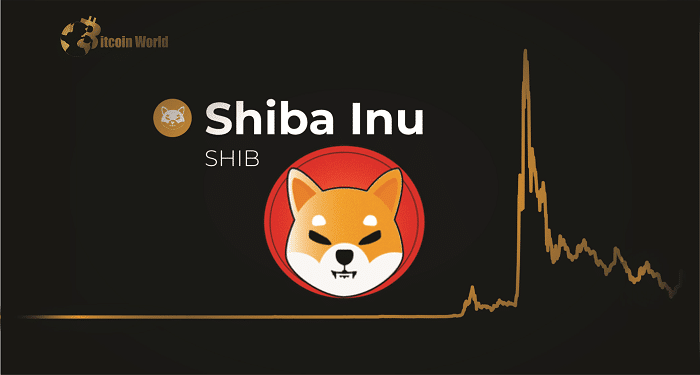Hold onto your digital dog collars, crypto enthusiasts! The meme coin darling, Shiba Inu (SHIB), is experiencing a bit of a ruff patch. According to the latest data from CoinGecko, SHIB’s market capitalization has taken a 5.8% dip in the last 24 hours. That’s a significant wag of the tail downwards, leaving investors wondering, ‘What’s going on with our favorite Shiba?’ Let’s dig into the details and see what’s shaking up the SHIB ecosystem and the broader crypto world.
Shiba Inu’s Market Cap: A Closer Look at the Numbers
Currently, Shiba Inu’s market capitalization hovers just below the $6 billion mark. While that’s still a hefty sum, it’s a notable decrease, reflecting the current market sentiment and investor behavior. To put things in perspective, let’s break down the key stats:
- Current Market Cap: Just under $6 billion
- 24-Hour Market Cap Decrease: 5.8%
- Drop from All-Time High: 88.20%
- All-Time High (October Last Year): $0.000086
The most striking figure here is the 88.20% drop from SHIB’s all-time high achieved in October of last year. That’s a substantial correction, highlighting the volatile nature of the cryptocurrency market, especially for meme coins like Shiba Inu known for their dramatic price swings.

The FTX Factor: How Crypto Contagion is Spreading
If you’ve been following crypto news, you’ve likely heard about the FTX saga. As BitcoinWorld reported, the FTX fallout has sent ripples across the entire cryptocurrency landscape. The collapse of FTX, once a major crypto exchange, triggered a wave of fear and uncertainty, leading to significant sell-offs across the board.
Bitcoin, the king of crypto, wasn’t immune, plummeting to a new yearly low of $17,114. Ethereum and other major cryptocurrencies also experienced significant drops. This market-wide downturn is largely attributed to the ‘FTX contagion’ – the interconnectedness of the crypto ecosystem. When a large player like FTX falters, it shakes confidence and raises concerns about the stability of other platforms and assets.
The current total market capitalization for all cryptocurrencies stands at $954 billion. While still a massive number, it reflects a considerable contraction from previous highs, indicating a broader cooling off and correction in the crypto market.
Why is Shiba Inu Feeling the Heat?
So, why is Shiba Inu particularly affected by these market tremors? Several factors could be at play:
- Meme Coin Volatility: Meme coins, by their nature, tend to be more volatile than established cryptocurrencies like Bitcoin or Ethereum. Their prices are often driven by social media trends, community sentiment, and hype, making them more susceptible to market fluctuations and fear-based selling.
- Broader Market Sentiment: The overall negative sentiment in the crypto market, fueled by the FTX situation and macroeconomic uncertainties, is impacting all cryptocurrencies, including SHIB. Investors are generally more risk-averse in times of uncertainty, leading to a flight from riskier assets like meme coins.
- Profit Taking: Some investors who made substantial gains during SHIB’s meteoric rise last year might be taking profits, further contributing to the downward pressure on the price.
Is This the End of the Bark for SHIB?
While the current market conditions might seem concerning, it’s crucial to remember that the cryptocurrency market is known for its cycles. Downturns and corrections are a natural part of the process. Whether this marks a prolonged ‘crypto winter’ or a temporary dip remains to be seen.
For Shiba Inu specifically, the community remains a strong and active force. The SHIB ecosystem is also expanding with projects like Shibarium, a Layer-2 scaling solution, which could potentially bring more utility and use cases to the SHIB token in the future. However, it’s important to acknowledge the risks involved in cryptocurrency investments, especially with meme coins.
Navigating the Crypto Dip: What Should Investors Do?
In times of market uncertainty, it’s essential to stay informed and make rational decisions. Here are a few actionable insights for crypto investors navigating this dip:
- Do Your Own Research (DYOR): Never invest blindly. Understand the projects you are investing in, their fundamentals, and the risks involved.
- Diversify Your Portfolio: Don’t put all your eggs in one basket. Diversification across different asset classes can help mitigate risk.
- Consider Dollar-Cost Averaging (DCA): Instead of trying to time the market, consider DCA – investing a fixed amount of money at regular intervals. This can help average out your entry price over time.
- Long-Term Perspective: Cryptocurrency investments should generally be viewed as long-term. Market volatility is expected, and focusing on the long-term potential can help weather short-term storms.
- Manage Risk: Only invest what you can afford to lose. The crypto market is inherently risky, and price fluctuations are part of the game.
- Stay Informed, But Avoid FUD: Keep up with market news and developments, but be wary of Fear, Uncertainty, and Doubt (FUD) that can spread rapidly in the crypto space.
The Road Ahead for Shiba Inu and Crypto
The current dip in Shiba Inu’s market cap reflects broader market trends and the inherent volatility of the crypto space. While the numbers might seem concerning in the short term, the crypto market has shown resilience in the past. Whether SHIB can regain its previous highs remains to be seen, but the community and ongoing development efforts within the Shiba Inu ecosystem are factors to watch.
For now, it’s a time for caution, informed decision-making, and perhaps a bit of patience for crypto investors. The crypto journey is often a rollercoaster, with ups and downs. Understanding the market dynamics and managing risk are key to navigating these turbulent times and positioning yourself for potential future growth in the exciting world of cryptocurrencies.
Disclaimer: The information provided is not trading advice, Bitcoinworld.co.in holds no liability for any investments made based on the information provided on this page. We strongly recommend independent research and/or consultation with a qualified professional before making any investment decisions.


